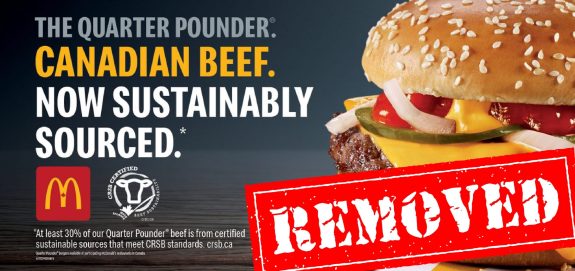McDonald’s has stopped running a greenwashing ad campaign about its Quarter Pounder burger after an Animal Justice legal complaint prompted investigations by federal regulators.
McDonald’s unveiled an ad campaign last fall that attempted to re-brand the Quarter Pounder burger as an environmentally sustainable product. The ads, which appeared on billboards and in transit stations in major cities across Canada, stated that the Quarter Pounder burger was “now sustainably sourced”. In the fine print, McDonald’s supported this dubious claim by stating that “at least 30%” of the beef used in the Quarter Pounder is from so-called “sustainable” sources certified by the Canadian Roundtable for Sustainable Beef (CRSB)—an industry marketing group formed to try to legitimize “sustainable” beef production in the public eye and justify beef farmers’ social licence to operate.
In response to these shockingly misleading ads, Animal Justice requested that the Canadian Food Inspection Agency (“CFIA”) and Competition Bureau investigate whether the ads ran afoul of Canada’s consumer protection laws—which make it illegal to mislead the public with false claims about sustainability. We asked these agencies to take action and ensure that these false and misleading ads were taken down.
And it worked! In response to Animal Justice’s complaint, the Competition Bureau opened an inquiry, and met with McDonald’s to facilitate voluntary compliance with consumer protection laws. The CFIA also conducted an investigation and discussed the matter with the company. The agencies confirmed to Animal Justice that McDonald’s has now stopped running the ads.
Claims that beef is “sustainable” are scientifically indefensible. The CRSB’s certification standards have been criticized as vague and unenforceable, leaving the door wide open to greenwashing. In reality, meat and dairy production are the biggest sources of greenhouse gas emissions (“GHGs”) from the agricultural sector—especially beef. Raising animals for meat is responsible for at least 14.5 percent of all human-caused GHGs, similar to the share of emissions that come from cars. Other estimates put the percentage even higher. Animal agriculture is also a leading driver of global biodiversity loss.
Comparing the environmental impact of beef to plant-based foods like potatoes, wheat, and rice should be a wakeup call for environmentally conscious consumers. Per calorie, beef products require up to 160 times more land and produce 11 times more GHGs. The water footprint of meat from cows is the largest of all animal products, and dwarfs the water footprint of crop products. For instance, the average water footprint per calorie for beef is twenty times larger than for cereals and starchy roots.
Canadians are increasingly reducing or eliminating meat in their diets, motivated not only by a desire to reduce animal suffering, but also to reduce their environmental footprint and prevent catastrophic global climate change and biodiversity loss.
Animal Justice commends the action taken by the CFIA and the Competition Bureau to combat deceptive greenwashing by McDonald’s. The rise of deceitful marketing tactics has dangerous potential to mislead consumers and promote the sale of environmentally harmful products. Holding McDonald’s accountable for its misleading advertising is a step in the right direction.
Join the Animal Justice mailing list




